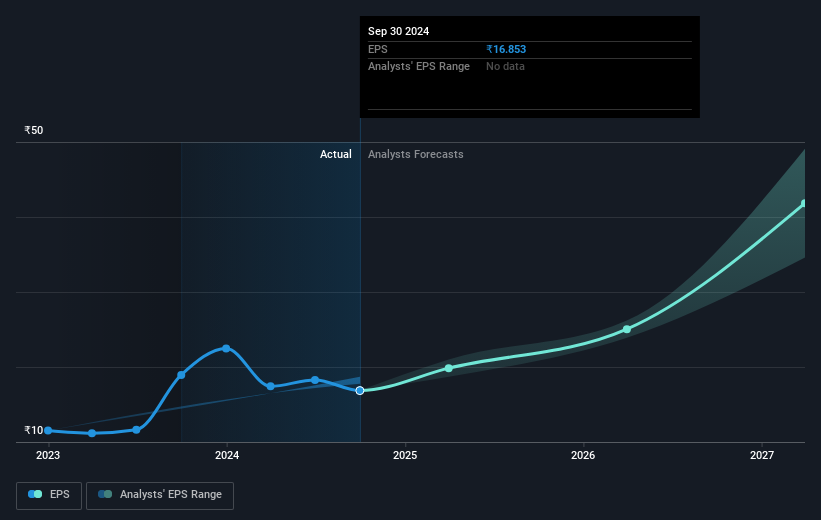- India
- /
- Construction
- /
- NSEI:MANINDS
Man Industries (India)'s (NSE:MANINDS) five-year earnings growth trails the enviable shareholder returns

Long term investing can be life changing when you buy and hold the truly great businesses. While not every stock performs well, when investors win, they can win big. To wit, the Man Industries (India) Limited (NSE:MANINDS) share price has soared 813% over five years. If that doesn't get you thinking about long term investing, we don't know what will. Better yet, the share price has risen 15% in the last week. Anyone who held for that rewarding ride would probably be keen to talk about it.
The past week has proven to be lucrative for Man Industries (India) investors, so let's see if fundamentals drove the company's five-year performance.
See our latest analysis for Man Industries (India)
In his essay The Superinvestors of Graham-and-Doddsville Warren Buffett described how share prices do not always rationally reflect the value of a business. One way to examine how market sentiment has changed over time is to look at the interaction between a company's share price and its earnings per share (EPS).
Over half a decade, Man Industries (India) managed to grow its earnings per share at 24% a year. This EPS growth is lower than the 56% average annual increase in the share price. So it's fair to assume the market has a higher opinion of the business than it did five years ago. And that's hardly shocking given the track record of growth.
You can see how EPS has changed over time in the image below (click on the chart to see the exact values).

This free interactive report on Man Industries (India)'s earnings, revenue and cash flow is a great place to start, if you want to investigate the stock further.
What About Dividends?
As well as measuring the share price return, investors should also consider the total shareholder return (TSR). The TSR incorporates the value of any spin-offs or discounted capital raisings, along with any dividends, based on the assumption that the dividends are reinvested. Arguably, the TSR gives a more comprehensive picture of the return generated by a stock. In the case of Man Industries (India), it has a TSR of 900% for the last 5 years. That exceeds its share price return that we previously mentioned. And there's no prize for guessing that the dividend payments largely explain the divergence!
A Different Perspective
It's nice to see that Man Industries (India) shareholders have received a total shareholder return of 31% over the last year. Of course, that includes the dividend. However, that falls short of the 58% TSR per annum it has made for shareholders, each year, over five years. The pessimistic view would be that be that the stock has its best days behind it, but on the other hand the price might simply be moderating while the business itself continues to execute. I find it very interesting to look at share price over the long term as a proxy for business performance. But to truly gain insight, we need to consider other information, too. For instance, we've identified 2 warning signs for Man Industries (India) (1 is potentially serious) that you should be aware of.
Of course Man Industries (India) may not be the best stock to buy. So you may wish to see this free collection of growth stocks.
Please note, the market returns quoted in this article reflect the market weighted average returns of stocks that currently trade on Indian exchanges.
New: Manage All Your Stock Portfolios in One Place
We've created the ultimate portfolio companion for stock investors, and it's free.
• Connect an unlimited number of Portfolios and see your total in one currency
• Be alerted to new Warning Signs or Risks via email or mobile
• Track the Fair Value of your stocks
Have feedback on this article? Concerned about the content? Get in touch with us directly. Alternatively, email editorial-team (at) simplywallst.com.
This article by Simply Wall St is general in nature. We provide commentary based on historical data and analyst forecasts only using an unbiased methodology and our articles are not intended to be financial advice. It does not constitute a recommendation to buy or sell any stock, and does not take account of your objectives, or your financial situation. We aim to bring you long-term focused analysis driven by fundamental data. Note that our analysis may not factor in the latest price-sensitive company announcements or qualitative material. Simply Wall St has no position in any stocks mentioned.
About NSEI:MANINDS
Man Industries (India)
Manufactures, processes, and trades in submerged arc welded pipes and steel products in India.
Undervalued with high growth potential.
Similar Companies
Market Insights
Community Narratives




